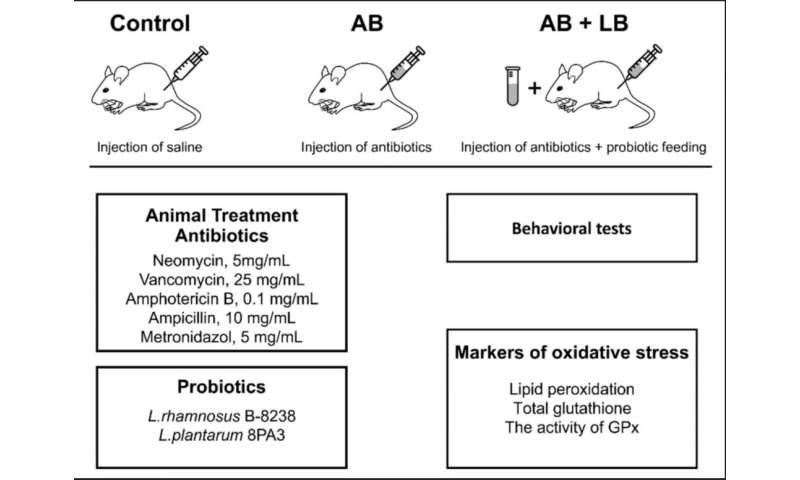Probiotics prove effective in treating antibiotics-induced dysbiosis in mice

A paper by Kazan Federal University saw light in Life.
The gut microbiota consists of a complex community of microorganisms which inhabit the gastrointestinal tract. Disbalance of this community induces not only various intestinal disorders, but also dysfunctions of the central nervous system. Gut microbiota plays a critical role in maintaining the function of gastrointestinal tract and general health. An increasing amount of data demonstrates a close relationship between microbiota and brain through the nervous system, as well as through the endocrine, immune and metabolic system. This bidirectional communication between brain and gut is referred to as the "brain-gut axis".
Antibiotic treatment is the most common way to induce dysbiosis. Gut–brain axis imbalance caused by antibiotics may result in neurobehavioral alteration, the degree of which depends on the type of antibiotic, duration of treatment, and age of animals. One of the methods for dysbiosis treatment is to administrate probiotics. Beneficial effects are mediated by production of enzymes, promoting fermentation, such as short chain fatty acids (SCFAs), and other metabolites or vitamins.
In this paper, the team revealed that broad-spectrum antibiotics administration resulted in higher mortality and lower weight gain and induced significant changes in the behavior of animals, including decreased locomotor and exploratory activity, reduced muscle strength, visceral hypersensitivity, increased anxiety, and impaired cognitive functions. These changes were accompanied by a decreased diversity of gut microbiota and an increase in pathogenic bacteria content. Moreover, dysbiosis was associated with a higher level of oxidative stress found in brain and skeletal muscle tissues. At the same time, treatment with lactobacilli prevented the observed changes and improved not only microbiota content but also the behavioral alterations, suggesting a neuroprotective and antioxidant role of probiotics.
The study demonstrates that administration of antibiotics not only directly affects the composition of the microbiota but also causes oxidative stress and dysfunction of the central nervous system in adolescent mice. This result strengthens the hypothesis about a close relationship between the microbiota and brain, especially in the early postnatal period. At the same time, treatment with lactobacilli prevented the observed changes and improved not only microbiota diversity but also the behavioral alterations. Taken together, probiotics have significant preventive and therapeutic potential for restoring a disturbed microflora, but also for supporting cognitive functions, motor behavior and muscle strength, as well as prevention of oxidative stress and visceral hypersensitivity.
Future studies are necessary to identify comprehensive mechanisms of microbiota effects on brain functioning. Dysbiosis was shown to be accompanied by increased permeability of the intestine and the blood–brain barrier due to inflammation, which results in the invasion of various bacteria and their metabolites from the blood to the brain. Therefore, the assessment of the plasma level of pro- and anti-inflammatory cytokines is an important aspect of the protective action of probiotic treatment in dysbiosis. Moreover, clinical studies suggest therapeutic significance of such bacterial metabolites as SCFAs in the treatment of the gastro-intestinal disorders associated with microbial dysbiosis; however, the experimental data of the effects of SCFAs on the functions of the central nervous system is currently insufficient.
More information:
Protective Effects of Probiotics on Cognitive and Motor Functions, Anxiety Level, Visceral Sensitivity, Oxidative Stress and Microbiota in Mice with Antibiotic-Induced Dysbiosis
www.mdpi.com/2075-1729/11/8/764
Provided by Kazan Federal University